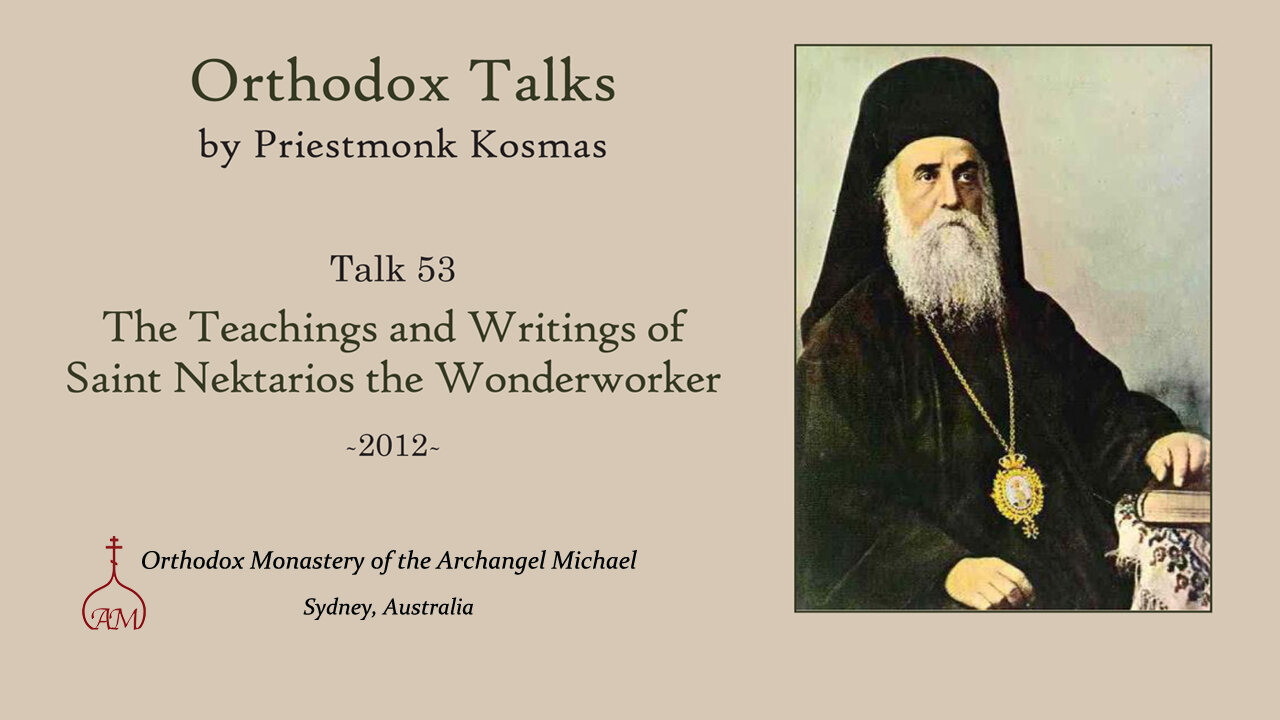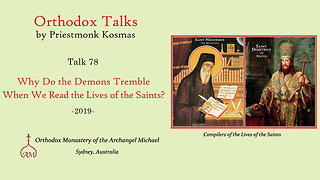Premium Only Content

Talk 53: The Teachings and Writings of Saint Nektarios the Wonderworker
Orthodox Talks by Priestmonk Kosmas, Sydney, Australia
www.OrthodoxTalks.com
iTunes: https://podcasts.apple.com/us/podcast/orthodox-talks/id1659252607
Spotify: https://open.spotify.com/show/0sKZoGUhAjJua9RtjoZS73
Podcast: https://rss.com/podcasts/orthodoxtalks/
Many know of the great Greek saint of the last century, Nektarios of Pentapolis the Wonderworker. Saint Nektarios is especially known for the countless miracles that he has performed, and many turn to him for help in their time of need. Yet the majority of these people know very little about this saint’s life, and still less about his beneficial teachings and writings.
In this talk, Father Kosmas examines a broad selection of the saint’s teachings and writings. He describes how many modernists have given a distorted view of Saint Nektarios’ character, saying that out of humility and meekness he did not speak out against the enemies of the Church, when in fact the opposite is true. Saint Nektarios was especially critical of the “wolves in sheep’s clothing” in the Church, and of the incorrect teachings of the Roman Catholic and Protestant Churches.
The following questions are also discussed: why did the saint praise some of the writings of the pagan philosophers? Did the saint teach that memorial services can free some of those held in Hades? What did the saint write concerning the possibility of union between the Orthodox Church and the Roman Catholics? What was the saint’s attitude towards frequent Holy Communion? What valuable advice did the saint give concerning confession? Why is self-knowledge absolutely essential for salvation?
Other points covered in this talk include: the saint’s condemnation of the Western dogma of purgatory; his view on Darwin and evolution; how the rapidly-spreading message of “don’t judge” is actually demonic; how some confuse weakness and fear with the virtues of humility and meekness; how Orthodox ecumenists proudly believe that they are above the Holy Fathers of the Orthodox Church; and Saint Nektarios’ teaching concerning the Holy Theotokos and the saints.
-
 4:00:03
4:00:03
Orthodox Talks
1 year agoTalk 78: Why Do the Demons Tremble When We Read the Lives of the Saints?
1.85K1 -
 14:33
14:33
IsaacButterfield
10 hours ago $1.99 earnedINSANE WOKE MEN OF TIKTOK!
19.7K11 -
 1:58:16
1:58:16
The Charlie Kirk Show
2 hours agoAmericaFest: Day 2 | Beck, McKoon, Steele, Nagao, Galaszewski, Bowyer, Brown, Amanchukwu | 12.20.24
77.9K3 -
 54:15
54:15
The Dan Bongino Show
5 hours agoSaving The U.S. Military w/ SEAL Andy Stumpf (Ep. 2392) - 12/20/2024
529K714 -
 LIVE
LIVE
The Dana Show with Dana Loesch
2 hours agoGOVERNMENT SPENDING BILL FAILS | The Dana Show LIVE On Rumble!
703 watching -
 LIVE
LIVE
Scammer Payback
2 hours agoCalling Scammers Live
234 watching -
 1:01:34
1:01:34
Dr. Eric Berg
3 days agoThe Dr. Berg Show LIVE December 20, 2024
42.6K5 -
 1:01:03
1:01:03
The Rubin Report
4 hours agoTech Legend Gives the Real Odds of Elon Musk Successfully Cutting Gov’t | Joe Lonsdale
57.6K9 -
 1:33:00
1:33:00
The Shannon Joy Show
6 hours ago🔥🔥Chip Roy's Fabulous Christmas Shutdown - Mr. Scrooge Or Miracle On K-Street? 🔥🔥
19.4K5 -
 53:31
53:31
Dave Portnoy
6 hours agoThe Unnamed Show With Dave Portnoy, Kirk Minihane, Ryan Whitney - Episode 40
62.2K